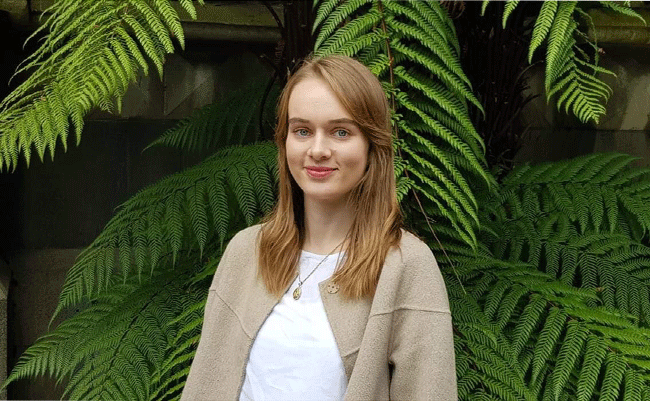Tuesday 8 October 2019 2:35pm

History graduate Kate Tilson, who took up a prestigious PhD scholarship at Cambridge this week.
History graduate Kate Tilson says support from Division of Humanities staff paved the way to a prestigious Cambridge PhD scholarship.
Kate, who completed her History honours dissertation in 2017 and has since been a research assistant on various projects in the Division, took up the Harding Distinguished Postgraduate Scholarship at Cambridge this week.
"I would not be attending Cambridge, or have even considered applying, without the support and encouragement of all History staff, especially History Professor Takashi Shogimen who suggested I pursue postgraduate study at Cambridge."
“I would not be attending Cambridge, or have even considered applying, without the support and encouragement of all History staff, especially History Professor Takashi Shogimen who suggested I pursue postgraduate study at Cambridge.
“The incredible level of teaching, and the amazing opportunities offered throughout my study, made it possible,” she says.
At Cambridge her thesis will have a “global focus”, drawing on themes from her Honours dissertation, which was entitled The Interweaving of Māori and Missionary Worlds: Healing as a Material and Metaphysical Bridge.
Kate’s supervisor will be African missionary historian Professor David Maxwell, whose research she referred to in her dissertation.
Her research will require extensive archival investigation, and she looks forward to delving into records in the UK, mainly at the Council for World Mission Archives at the School of Oriental and African Studies in London and the Royal Commonwealth Society Collections at the University of Cambridge.
Archives in the Pacific, including the Alexander Turnbull Library and Hocken Collections in New Zealand, the Mitchell Library and National Library, Australia, and in Papeete and Nuku’alofa, will also provide important information.
Kate is no stranger to scouring archives; her Otago dissertation – supervised by Associate Professor John Stenhouse and Professor Barbara Brookes – involved many hours at the Hocken Collection.
This work revealed that in early nineteenth-century New Zealand medicine incorporated a blend of religious and physical concerns – for Māori and missionaries alike.
"Professor Ballantyne’s work on Māori and missionary interactions provided a foundation for my own study, and he also completed Honours at Otago and studied at Cambridge, so it feels very special to follow in his footsteps."
“I concluded that early medical interactions between the two cultures were transformative both materially and culturally. I think medicine is often discussed in a purely objective manner, so it was interesting to examine medicine’s cultural ‘weight’.”
Kate credits Professor John Stenhouse’s “fascinating” HIST308: New Zealand Society and Religion for inspiring her interest in cross-cultural interactions.
“It challenged my perspective on a range of issues, and left me with a lot of questions from a theoretical perspective about the nature of colonial history and the significance of ideas, which I wanted to explore in future study. Health, religion, colonial legacy, and their connectedness, remain extremely pertinent discussions today, and I hope my research will contribute new insights.”
After completing her PhD, Kate would like to work as a historian in New Zealand or Australia.
“I never expected to follow this path as a first year but it’s one that feels achievable and extremely exciting thanks to my time at Otago.
“[Humanities Pro-Vice-Chancellor] Professor Ballantyne’s work on Māori and missionary interactions provided a foundation for my own study, and he also completed Honours at Otago and studied at Cambridge, so it feels very special to follow in his footsteps. I’ll be forever grateful for his outstanding guidance and confidence in my future as an historian.”
Kate is also this year’s Shirtcliffe Fellowship recipient, which entitles her to $5,000 a year for the next three years’ study.
